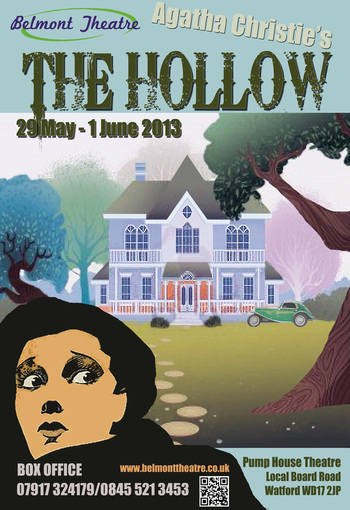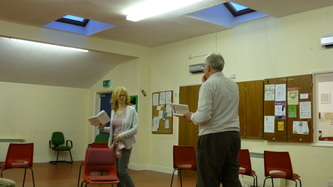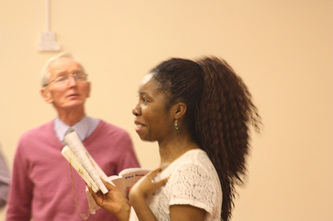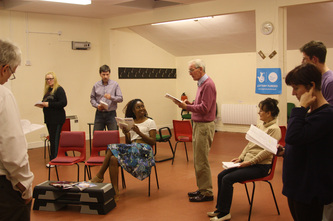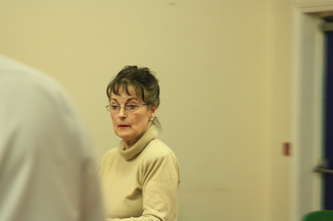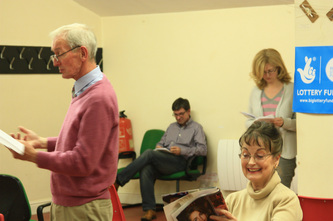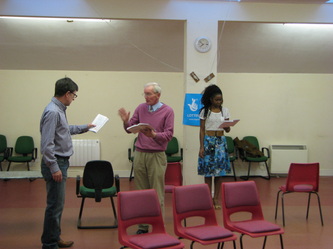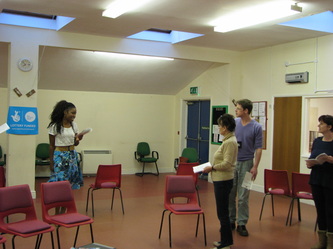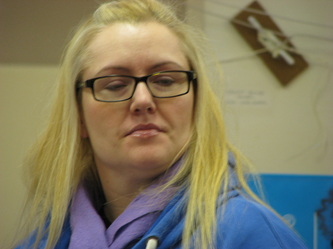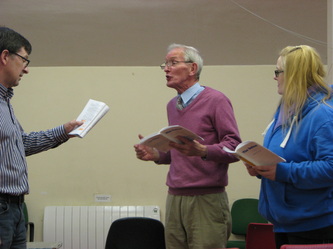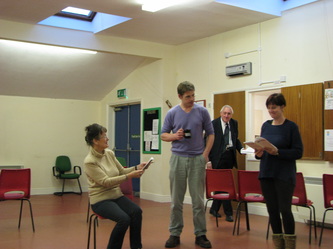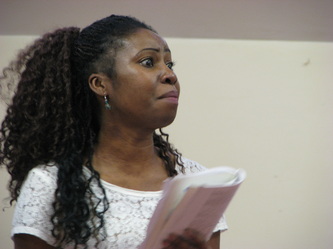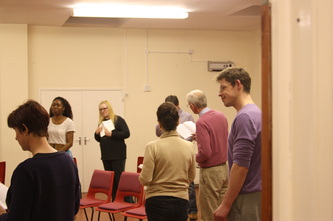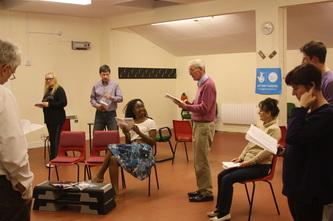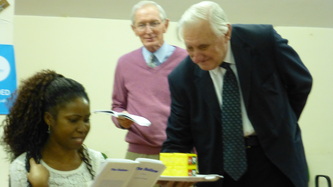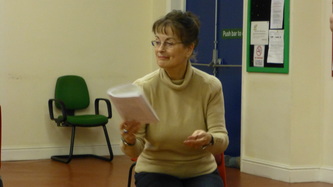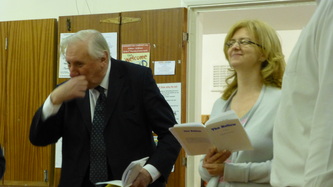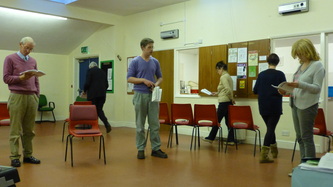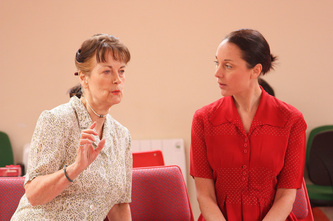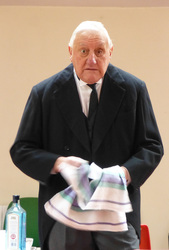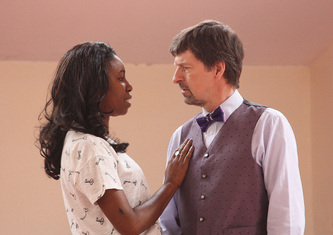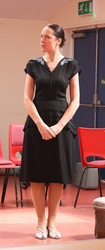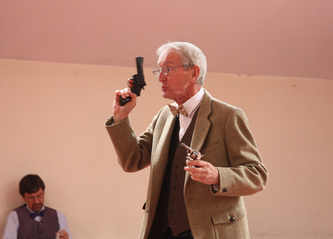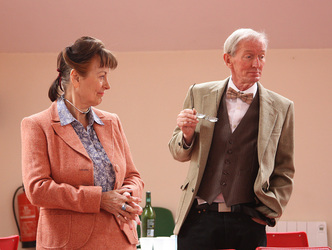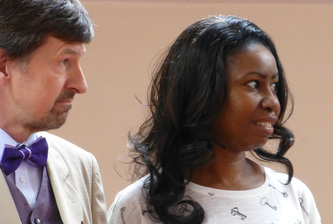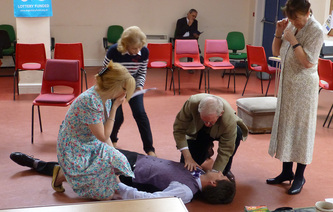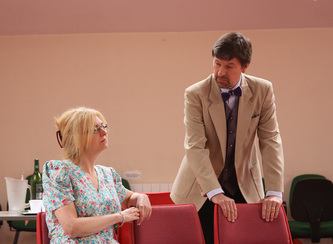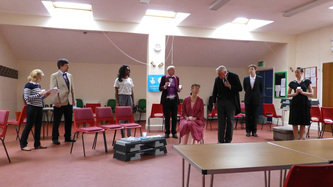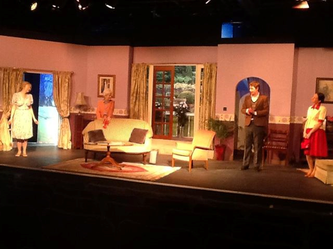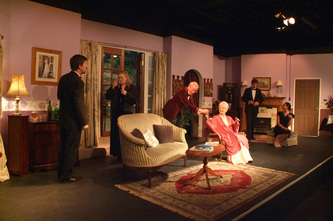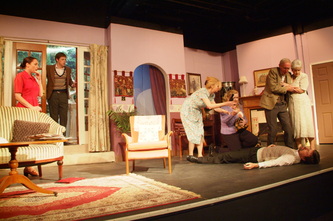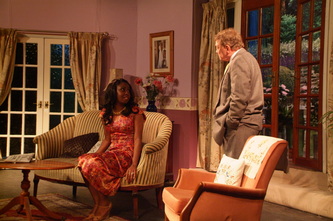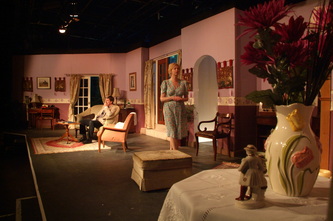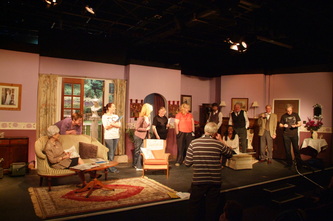The HollowWritten by: Agatha Christie
Directed by:Paul Botly Performed at the Pump House Theatre, Watford. 29th May to Saturday 1st June 2013 On the morning that he and his downtrodden wife, Gerda, are due to travel down to the country to weekend with friends, John Christow allows his little daughter to tell his fortune with cards. When the death card is drawn, he pays no attention, but the appearance of an old flame at The Hollow seems to be the final link in a chain of fatal circumstances.
| |||||||
Cast and Crew
Cast
|
Appointments
|
Gallery
Rehearsals
Costume Rehearsals
Dress Rehearsals
Publicity
Noda Report
National Operatic & Dramatic Association - London Region
In 1946 Agatha Christie wrote ‘The Hollow’, a crime thriller, featuring the Belgian private detective Hercule Poirot. She had already written several successful books featuring him, so it was rather strange that she omitted him from her adaptation of the book into a stage production having said she did not like the man. Again it was unusual as even after the play, she continued to write successful thrillers where Poirot was the central character. In fact he does appear in thirty-three of her thrillers. Furthermore Poirot was ‘restored’ in a TV production of the play shown in 2004 several years after her death in 1976. Christie also wrote under the name of Mary Westmacott. Her publisher in the U.K. was William Collins and for many years around Christmas time she produced a new thriller. The print run in those days ran into many thousands and in spite of not appearing in any newspaper as a best seller, the edition often ‘sold out’. This was followed by a cheaper edition and then as a Fontana paperback. So Collins managed to get quite a good return on publishing Agatha Christie’s thrillers. How do I know this? Well, I worked for Collins!!
Sir Henry Angketell and his wife Lady Lucy had invited various friends and relations to a weekend party at their retirement home situated a few miles from London. Already at the house was Henrietta, a young cousin of Sir Henry. Henrietta was a very successful sculptor who had used the wife of another guest, Gerda Cristow, as a model. Michael Collins was a rather laid back Sir Henry, putting up with his rather ‘dottie’ wife. It was a very elegant performance and certainly gave the impression of a true gentleman of the ‘old’ school, able to take the most bizarre actions of his wife with aplomb. There was a gem of a performance by Jane Willis as the very eccentric Lady Lucy Angketell. Seemingly perhaps ‘not quite with it’, wandering in with a lobster in order to see whether its colour would be suitable for covering the settee, was just one of the eccentric things she did. However, one felt she probably knew more of what was happening in the household than anybody else. The tone and the very ‘upper class accent’ she used in her dialogue was wonderful; almost an Edith Evans, and she managed to get every ounce of comedy there was in the script. A wonderful ‘aristocratic’ performance by a talented actress. Tatiana Cook as Henrietta, could perhaps have been a slightly stronger character. The stage at the Pump House is rather wide and it is quite easy for a performer’s dialogue to be too quiet to be heard when standing right or left of centre facing slightly up stage. Tatiana was inclined to drop her voice at the end of sentences especially when talking ‘across’ the stage and there was a slight tendency to up-stage herself. When she positioned herself correctly, everything was fine. Her scene with John Cristow, when it is revealed that she had been his mistress, came as a surprise and his rejection was sure to result in tragedy. Edward Angketell, a distant cousin of Sir Henry who, because Henry and his wife had not ‘produced’ a male heir, had inherited the family seat Ainswick and was hoping to persuade Henrietta to marry and come to live with him at Ainswick. Her refusal was taken badly and this was clearly shown in the acting of Nick Baldock, who seemed most distraught at being ‘turned down’ especially when he learned of the ‘association’ between her and Cristow. Nick was a very intense player who showed his emotions very well. He was ‘saved’ by finding consolation in the love of Midge Harvey, a cousin of Lady Lucy. Midge, played by Michelle Gough, was a down to earth character, the ‘poor’ relation of Lady Lucy, who worked in an up market dress shop. She was probably the most believable, sensible character and the only one who relied upon a job to pay her way. Michelle was very good, showing her affection for Edward who finally learned about it after being upset by Henrietta’s rejection.
The arrival of Dr. John Cristow and his rather timid wife Gerda seemed to put the ‘cat amongst the pigeons’. (Another Christie thriller) Whilst Gerda was occupied elsewhere, Cristow and Henrietta were alone and it was then we learned about their relationship that had lasted some six months. Mike Bland played Cristow as a rather obnoxious character, rather dismissive of his wife’s intelligence, full of his own importance, self-confident and overall not a particularly nice man. It was a very good strong performance, and Mike carried it off very well. One immediately felt sorry for his wife Gerda, a nice ‘timid’ performance by Barbara Davies. Gerda seemed overawed by her clever husband and tried to keep a low profile when in company with other characters. But, after realizing her husband’s infidelity, her whole attitude towards him changed, she seemed to grow in stature that led her to murdering him. The arrival of Veronica Craye caused eyebrows to be raised. Veronica was a well-known actress who had come to live nearby. She had made the excuse of wanting to ‘borrow’ some matches in order to light candles as the power in her cottage had failed. In noticing John Cristow she reveals they had had an ‘affair’ in the past. Later, when alone with John, she tells him she wants to leave her husband, expects him to leave his wife and marry her. When he pointed out that was not possible, in a fury she retorted that “If I can’t have you, no one shall’. Mary-Anne Anaradoh was a feisty Veronica Cray whose change from being a rather nice person to becoming angry was excellent as was her ‘cultivated’ American accent. The scene was therefore set for a murder to be committed and, when John Cristow is found shot, with his wife bending over him with a gun, it seemed to be an open and shut case, although there was the distinct possibility that other characters whom he had upset could equally be found guilty. Throughout the play Gudgeon, the butler made several appearances. This was a lugubrious performance by Bernard Vick whose woeful expression and rather ‘flat’ dialogue gave a great deal of amusement reminiscent of an English butler in early American films. A really wonderful performance. The household also had a maid, Lottie Rebello played Doris who seemed to be rather in awe of Gudgeon. whom she had seen earlier with a revolver, although it seemed that the gun had been hidden in a basket of eggs belonging to Lucy, although why, she couldn’t remember. Gudgeon was attempting to cover for her. Although rather a small role, Lottie proved that the smallest of parts is important to the success of any play.
There were two excellent performances by Bill Baynes as Inspector Colquohoun and Bill Rebello as Sergeant Penny. Both quietly going about their investigation with great understanding of the situation in the Angketell household. Bill Baynes was the ideal Inspector, calm, efficient not just accepting the various statements, but able to sort out the ‘wheat from the chaff’, whilst the other Bill was a very useful assistant who quietly went about his duty, listening to his superior offering his own thoughts on the case. The case was solved when the Inspector found Gerda brandishing a revolver threatening Henrietta. Gerda had confessed to Henrietta that she was aware of the unfaithfulness of her husband and had decided to kill him. Having revealed this to her, Gerda then decided she would have to get ‘rid’ of Henrietta. The Inspector was just in time to prevent Gerda shooting Henrietta and, in handing Gerda a drink, not knowing she had ‘spiked’ it in order to kill Henrietta, she drank it and expired. Wow….
What a splendid production this was. One of the finest sets I have ever seen, giving the correct appearance of a ‘garden room’, as described in the programme, in a house owned by a very wealthy man. Nothing was out of place from the furniture to the paintings and tapestries on the walls. It was very well thought out, the lighting too, was just right. Careful attention had been given to the positioning of various table lamps that were independently switched on as required. Absolutely fantastic. This wonderful set was designed by Bill Baynes, Bill Rebello and Paul Botly and constructed by the company. The Lighting was designed by Mick Dolan and controlled by Lorna Alder who also was responsible for Sound. Helen Sherwood and Les Sutherland were responsible for the excellent Properties; Continuity, Laurence Conway (who on this night was silent). The Director, whom I cannot praise highly enough, was Paul Botly; Stage Manager, Carole Baynes, who before the play started came to the front of the stage inviting the audience to the home of the Angketells and to make certain mobile phones were switched off, a nice touch. Carole’s ASM was Lottie Rebello and the Producer was Bill Baynes.
This was a first class play acted by a superb cast, all of whom played their parts extremely well. No hiccups, with excellent pace that did not falter. It was good to see Bill Rebello and daughter Lottie come out of the shadows and appear on stage. Although the programme was very well set out with short biographies of the actors, a short biography of Agatha Christie etc., I would have preferred to see the cast listed in order of their appearance, not alphabetically, as unless that is done, it could make it rather difficult for some members of the audience to initially decide who is who. Just a thought!!
Although I have raved about the set, and rightly so, there was one thing that was not quite correct, when the flowers had been put in a vase and placed on the ‘coffee’ table, stage right, they were so high that it hid those sitting on the settee from the audience.
Finally, a special thank you to Estelle who looked after Sylvia and myself with the usual Belmont hospitality.
Sir Henry Angketell and his wife Lady Lucy had invited various friends and relations to a weekend party at their retirement home situated a few miles from London. Already at the house was Henrietta, a young cousin of Sir Henry. Henrietta was a very successful sculptor who had used the wife of another guest, Gerda Cristow, as a model. Michael Collins was a rather laid back Sir Henry, putting up with his rather ‘dottie’ wife. It was a very elegant performance and certainly gave the impression of a true gentleman of the ‘old’ school, able to take the most bizarre actions of his wife with aplomb. There was a gem of a performance by Jane Willis as the very eccentric Lady Lucy Angketell. Seemingly perhaps ‘not quite with it’, wandering in with a lobster in order to see whether its colour would be suitable for covering the settee, was just one of the eccentric things she did. However, one felt she probably knew more of what was happening in the household than anybody else. The tone and the very ‘upper class accent’ she used in her dialogue was wonderful; almost an Edith Evans, and she managed to get every ounce of comedy there was in the script. A wonderful ‘aristocratic’ performance by a talented actress. Tatiana Cook as Henrietta, could perhaps have been a slightly stronger character. The stage at the Pump House is rather wide and it is quite easy for a performer’s dialogue to be too quiet to be heard when standing right or left of centre facing slightly up stage. Tatiana was inclined to drop her voice at the end of sentences especially when talking ‘across’ the stage and there was a slight tendency to up-stage herself. When she positioned herself correctly, everything was fine. Her scene with John Cristow, when it is revealed that she had been his mistress, came as a surprise and his rejection was sure to result in tragedy. Edward Angketell, a distant cousin of Sir Henry who, because Henry and his wife had not ‘produced’ a male heir, had inherited the family seat Ainswick and was hoping to persuade Henrietta to marry and come to live with him at Ainswick. Her refusal was taken badly and this was clearly shown in the acting of Nick Baldock, who seemed most distraught at being ‘turned down’ especially when he learned of the ‘association’ between her and Cristow. Nick was a very intense player who showed his emotions very well. He was ‘saved’ by finding consolation in the love of Midge Harvey, a cousin of Lady Lucy. Midge, played by Michelle Gough, was a down to earth character, the ‘poor’ relation of Lady Lucy, who worked in an up market dress shop. She was probably the most believable, sensible character and the only one who relied upon a job to pay her way. Michelle was very good, showing her affection for Edward who finally learned about it after being upset by Henrietta’s rejection.
The arrival of Dr. John Cristow and his rather timid wife Gerda seemed to put the ‘cat amongst the pigeons’. (Another Christie thriller) Whilst Gerda was occupied elsewhere, Cristow and Henrietta were alone and it was then we learned about their relationship that had lasted some six months. Mike Bland played Cristow as a rather obnoxious character, rather dismissive of his wife’s intelligence, full of his own importance, self-confident and overall not a particularly nice man. It was a very good strong performance, and Mike carried it off very well. One immediately felt sorry for his wife Gerda, a nice ‘timid’ performance by Barbara Davies. Gerda seemed overawed by her clever husband and tried to keep a low profile when in company with other characters. But, after realizing her husband’s infidelity, her whole attitude towards him changed, she seemed to grow in stature that led her to murdering him. The arrival of Veronica Craye caused eyebrows to be raised. Veronica was a well-known actress who had come to live nearby. She had made the excuse of wanting to ‘borrow’ some matches in order to light candles as the power in her cottage had failed. In noticing John Cristow she reveals they had had an ‘affair’ in the past. Later, when alone with John, she tells him she wants to leave her husband, expects him to leave his wife and marry her. When he pointed out that was not possible, in a fury she retorted that “If I can’t have you, no one shall’. Mary-Anne Anaradoh was a feisty Veronica Cray whose change from being a rather nice person to becoming angry was excellent as was her ‘cultivated’ American accent. The scene was therefore set for a murder to be committed and, when John Cristow is found shot, with his wife bending over him with a gun, it seemed to be an open and shut case, although there was the distinct possibility that other characters whom he had upset could equally be found guilty. Throughout the play Gudgeon, the butler made several appearances. This was a lugubrious performance by Bernard Vick whose woeful expression and rather ‘flat’ dialogue gave a great deal of amusement reminiscent of an English butler in early American films. A really wonderful performance. The household also had a maid, Lottie Rebello played Doris who seemed to be rather in awe of Gudgeon. whom she had seen earlier with a revolver, although it seemed that the gun had been hidden in a basket of eggs belonging to Lucy, although why, she couldn’t remember. Gudgeon was attempting to cover for her. Although rather a small role, Lottie proved that the smallest of parts is important to the success of any play.
There were two excellent performances by Bill Baynes as Inspector Colquohoun and Bill Rebello as Sergeant Penny. Both quietly going about their investigation with great understanding of the situation in the Angketell household. Bill Baynes was the ideal Inspector, calm, efficient not just accepting the various statements, but able to sort out the ‘wheat from the chaff’, whilst the other Bill was a very useful assistant who quietly went about his duty, listening to his superior offering his own thoughts on the case. The case was solved when the Inspector found Gerda brandishing a revolver threatening Henrietta. Gerda had confessed to Henrietta that she was aware of the unfaithfulness of her husband and had decided to kill him. Having revealed this to her, Gerda then decided she would have to get ‘rid’ of Henrietta. The Inspector was just in time to prevent Gerda shooting Henrietta and, in handing Gerda a drink, not knowing she had ‘spiked’ it in order to kill Henrietta, she drank it and expired. Wow….
What a splendid production this was. One of the finest sets I have ever seen, giving the correct appearance of a ‘garden room’, as described in the programme, in a house owned by a very wealthy man. Nothing was out of place from the furniture to the paintings and tapestries on the walls. It was very well thought out, the lighting too, was just right. Careful attention had been given to the positioning of various table lamps that were independently switched on as required. Absolutely fantastic. This wonderful set was designed by Bill Baynes, Bill Rebello and Paul Botly and constructed by the company. The Lighting was designed by Mick Dolan and controlled by Lorna Alder who also was responsible for Sound. Helen Sherwood and Les Sutherland were responsible for the excellent Properties; Continuity, Laurence Conway (who on this night was silent). The Director, whom I cannot praise highly enough, was Paul Botly; Stage Manager, Carole Baynes, who before the play started came to the front of the stage inviting the audience to the home of the Angketells and to make certain mobile phones were switched off, a nice touch. Carole’s ASM was Lottie Rebello and the Producer was Bill Baynes.
This was a first class play acted by a superb cast, all of whom played their parts extremely well. No hiccups, with excellent pace that did not falter. It was good to see Bill Rebello and daughter Lottie come out of the shadows and appear on stage. Although the programme was very well set out with short biographies of the actors, a short biography of Agatha Christie etc., I would have preferred to see the cast listed in order of their appearance, not alphabetically, as unless that is done, it could make it rather difficult for some members of the audience to initially decide who is who. Just a thought!!
Although I have raved about the set, and rightly so, there was one thing that was not quite correct, when the flowers had been put in a vase and placed on the ‘coffee’ table, stage right, they were so high that it hid those sitting on the settee from the audience.
Finally, a special thank you to Estelle who looked after Sylvia and myself with the usual Belmont hospitality.
